DOs and DON’Ts for Your First US Road Trip
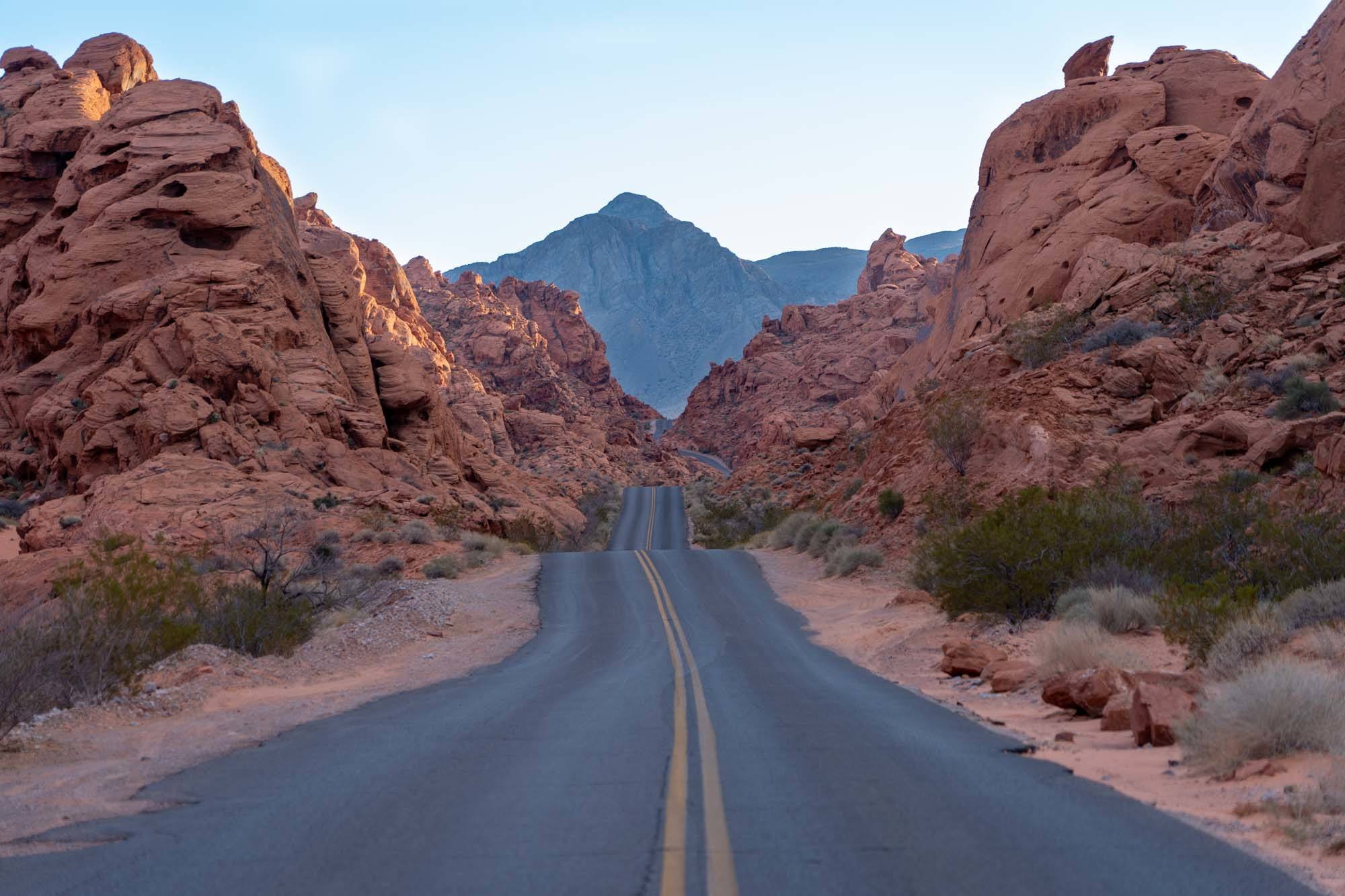
I think just about every American teenager (and probably plenty from abroad, as well) has dreamt about driving across the country in an epic Great American Road Trip. There's something just so inherently “cool” about the idea of tearing down a highway in the middle of nowhere, windows down, and music blasting as the miles slip by.
Plus, the U.S. is a really big place; there's a hell of a lot to see. And even though I've lived here my whole life, 30+ years in Ohio really isn’t the best representation of everything that America has to offer. From deserts to mountains to incredibly flat plains, “the rest” of the country is so diverse that a road trip always seemed like the ideal way to get to know it better.
RELATED: 25 Awesome Photos of the United States
So, in the summer of 2011, my sister and I finally made the dream a reality, packing up a car and hitting the road in what would become a 6,500-mile journey from Ohio to Las Vegas and back again.
Along with seeing and experiencing a ton of what the U.S. has to offer, we also learned a lot along the way about road tripping.
Since that trip, I've been on several more road trips in the United States, covering everything from the Southwest to the Pacific Northwest to the Old South. Each one has been unique in its own way, but the things I learned on that first trip with my sister still remain true today.
If you’re considering your own Great American Road Trip in the future, here are some of the DOs and DON’Ts I've picked up over the years.
Planning a road trip for summer 2020? If so, please check out this post with some tips specific to road tripping during the pandemic: Can You Safely Plan a US Road Trip this Summer?
Tips for planning a USA road trip
The average road trip dream probably consists of just throwing a few things into the trunk of a car and hitting the road. But the reality is that a good deal of planning is necessary if you want to have a successful, stress-free journey.
1. DO have a rough itinerary
You don't necessarily have to plot out anything strict or rigid if you don't want to, but having a rough itinerary of some sort will definitely help. You should have a good idea of what you’d like to do/see along the way, along with what stops you’d like to make.
Not only will this help you budget accordingly, but it will also help you figure out how much time you’ll need. People sometimes forget how big the US really is, and misjudge how long it will take them to travel from Point A to Point B.
On every US road trip I've taken, I usually decide which city I'll spend each night in, but then leave most of the days relatively open.
RELATED: Road Trip '11: My 10 Favorite Road Trip Stops
2. DON'T get too caught up in said itinerary
Plan too much, and you won't be able to make detours or stop randomly at roadside attractions, parks, or Native American-themed souvenir shops that you see advertised on the side of the highway along the way.
Whatever itinerary you come up with before your road trip, be sure to factor in some flexibility to allow for spontaneity, too.

3. DON'T wait until the last minute to do your research
For those who hate planning, listen up: Doing a bit of homework before you leave is essential whether you like it or not – especially if you’re going to be road tripping in the summer months. During the summer, many popular national parks and attractions are very busy and crowded, and you may need to book things ahead of time.
For example, if you want to camp or stay at a lodge at the Grand Canyon’s South Rim, you’ll have to make bookings months in advance. Similarly, if you’re traveling in the winter, it will be useful to know which roads through the Rockies usually close due to snow.
RELATED: Yes, You Can Visit the Grand Canyon in Winter
4. DO invest in maps
I’m not just talking about a Google Maps app on your iPhone – I’m talking about physical, fold-out maps. Old school.
Even though cell coverage is generally good within the US, you may still find yourself at times in areas where you won’t get signal at all. In these instances, having real maps on hand is smart. I've purchased several Rand McNally Road Atlases in the past, and they are always fantastic to have in the passenger seat, just in case
5. DO plan to stop at quirky roadside attractions
When you’re roadtripping across America, it's okay to be a tourist. In fact, I’d say it should be encouraged! Especially if you’ll be driving along old Route 66 at some point, there will be no shortage of quirky roadside attractions on offer. These are often what makes the journey fun. My sister and I especially loved the Cadillac Ranch in Amarillo, Texas, on our first road trip.
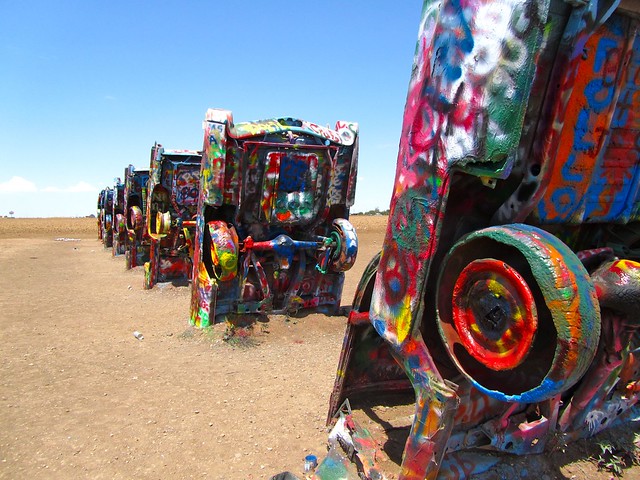
6. DON'T drive during rush-hour if you can help it
Especially when you're arriving in/leaving major cities, do your best to avoid rush-hour traffic at all costs. Not only will it increase your drive time exponentially, but it will likely cause you some unnecessary stress and frustration, too.
My sister and I made the mistake of leaving Chicago during rush hour, and subsequently spent nearly 2 hours traversing less than 30 miles on I-90.
7. DO visit national parks.
The U.S. national park system is fantastic, and has worked for decades to preserve some of the best and most unique landscapes America has to offer.
Yes, places like the Grand Canyon, Yellowstone, and Zion National Park are often crowded, but they are popular for a very, very good reason. If you’re worried about crowds at some of these sites, plan to go early in the morning or late in the evening, or research some alternatives (for example, only 10% of visitors go to the secluded North Rim of the Grand Canyon).
RELATED: The Mighty 5: A Guide to Utah’s Stunning National Parks
8. DON'T travel with someone you can't stand to be with 24/7
There's no escape when you're in a car together for days or weeks on end, so make sure your travel buddy is one you can get along with. Bonus points if you share a similar taste in music and can make small-talk easily.
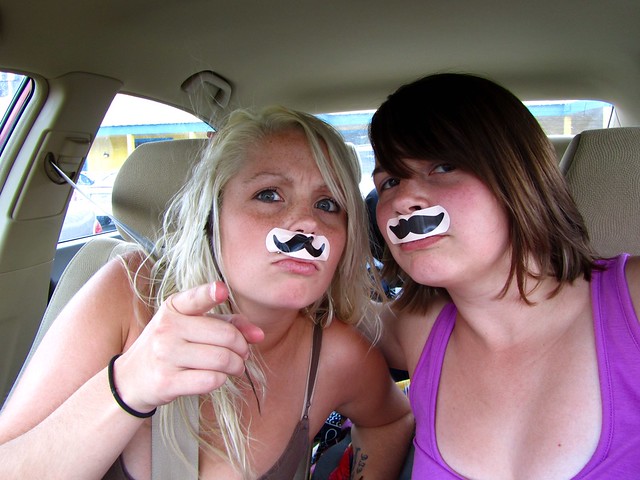
Tips for budgeting for a US road trip
Budgeting goes hand-in-hand with planning, really, but I figured it warranted its own section here, as the budget is probably the most important part of any road trip.
1. DO research basic costs before you leave
You'll know some of your costs upfront – for instance, if you're renting a car, or pre-booking all your accommodation. It's also fairly easy to estimate gas costs, and look up prices for hotels, motels, campsites, etc. in advance.
2. DO plan to spend more than you budgeted
I won’t lie to you: the USA is definitely not a cheap place to travel. While it IS usually cheaper to travel via car than plane in America, road tripping can go against this grain, since gas, food, and accommodation can all be expensive.
Set a budget for yourself, and then bring a little extra. My sister and I decided we would each leave Ohio with $1,500 (a total of $3,000 between us for our 3-week trip), but I made sure to bring about $500 extra, and we did end up tapping into that near the end of our trip. Even if personal finance isn't your thing, work out a budget – and then add to it.
3. DO decide beforehand how you will divide up costs
If you're traveling with friends, agree on money matters before you leave. Will you take turns paying for gas? Will you just pool all your money together and pay for everything out of that? How will you split meals? Figuring all of this out before you leave will save you headaches on the road.
4. DON'T be too cheap
Even though you don’t want to go crazy, don’t skip out on great experiences just because of a price tag. Life is too short for that. After all, you may never get the chance to visit some of these places again.
If you want to go whitewater rafting in Colorado, on a hot air balloon ride in Monument Valley, or to every museum you pass, do it. I’m sure your roadtripping dreams never included ending your adventure with regrets.
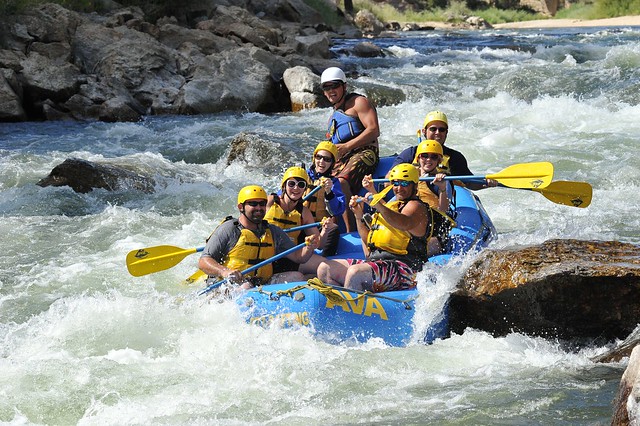
5. DO buy a National Parks Pass
If you plan to visit a lot of America’s national parks on your trip, definitely pick up a National Parks Pass. This pass costs $80, and then is good for a carload of people for a whole year. You can visit as many national parks as you want in that year without paying the entrance fees.
$80 may seem like a lot, but when you realize that many popular parks charge as much as $25-$35 per car to enter, it can all add up quickly.
6. DO sign up for AAA
If you’re an American, signing up for AAA may be a good idea. Not only will this auto club come to your rescue if you break down or get a flat, but being a AAA member can also score you discounts on everything from hotels to restaurants.
(And if you're not US-based, make sure you come prepped with travel insurance!)
Tips for finding Accommodation on a US road trip
Speaking of hotels, here are some tips on finding accommodation on the road.
1. DO consider alternatives to pricey hotels
While the U.S. is not as hostel-friendly as Europe and Australia, there are still plenty of budget-friendly accommodation options to be found here. The cheapest would be to bring a tent with you and plan to camp along the way (and pick up this guide to affordable campsites). However, you can’t simply pitch a tent on the side of any road in most U.S. states – you still have to pay for campsites.
Another alternative is to consider motels and budget hotels, which is what my sister and I did on that trip back in 2011. We tried to stick to the Choice Hotels brand as much as possible, and paid about $80 per night on average for a decent place to stay (which is about $40 per person per night, which really isn’t much more than you’d pay at a hostel here in the US). You can also check out apartment rental sites like Airbnb, which are increasingly popular options.
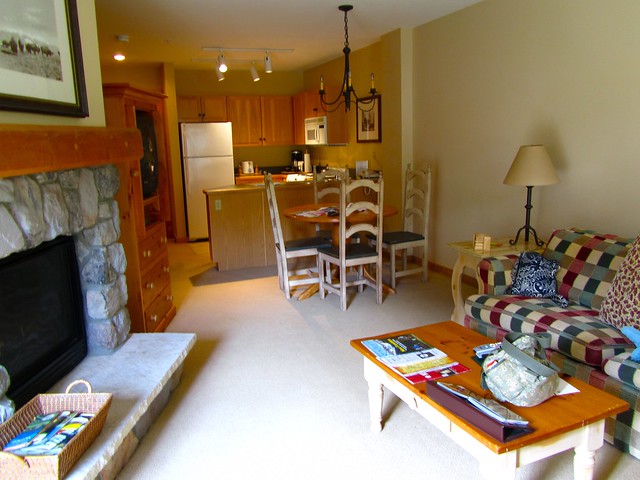
2. DON’T assume you can just drive into town and find a room.
This goes along with the “don’t wait until the last minute” tip in the planning section. While most cities you’ll visit will be large enough to have vacancies on any given night, others will not.
If you’re planning to visit a small city that’s a big tourist hot-spot at the time of year you’ll be visiting, definitely book ahead. My sister and I made the mistake of waiting too long to book a motel room in Page, Arizona (which is close to both Antelope Canyon and the Glen Canyon National Recreation Area), and ended up paying more than $160 per night for a dingy room at a Rodeway Inn. I was NOT happy about that.
Food tips for your USA road trip
1. DO take a cooler with you.
Not only will a cooler ensure that you always have enough water to keep yourself hydrated, but having a cooler can also be a great way to cut down on food costs – keep snacks or sandwich-making materials inside, and you won’t have to pay for as many meals.
2. DON'T expect to eat healthy
Even with a cooler in the trunk, chances are you’ll still be eating out a lot. If you travel like my sister and I did, with never more than 2 nights in one city, cooking for yourself will probably be the last thing you’ll want to do after a long day of driving.
Plus, it’s often difficult to say no to the delicious regional foods you’ll find along the way, regardless of how fattening they are.
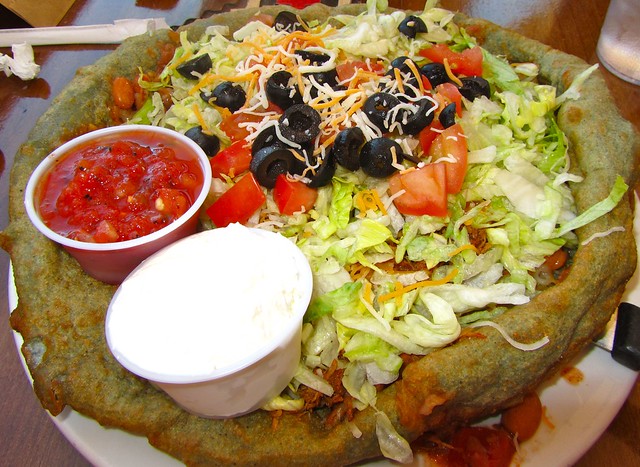
Safety tips for a US road trip
Staying safe on the road is probably not the first thing that comes to mind when considering a road trip, but it’s so important. Here are a few essential safety tips.
1. DO get your car checked out beforehand
This might be trickier if you’re renting a car, but if you’re taking your own or borrowing one from someone you know, do yourself a favor and get a tune-up before you leave. Get your tires, oil, and fluids checked, and make sure everything is running as it should.
This of course doesn’t guarantee that you won’t break down, but it helps. Also, be sure to keep an eye on things like tire pressure as you’re traveling, as it can help you get better gas mileage.
2. DO learn how to change a tire
You may not need the knowledge (and you may have AAA to bail you out), but it’s always a good idea to know how to change a tire if your only mode of transport for weeks is going to be a car.
3. DON'T forget your travel insurance
For any major trip (and especially one where you're going to be driving through unfamiliar territory), I always recommend purchasing travel insurance.
If you rent a car (or drive your own), your car should be covered in case of an accident. But what about all the other things that could potentially happen to YOU? I recommend World Nomads for basic (and really affordable) travel insurance – because you just never know!
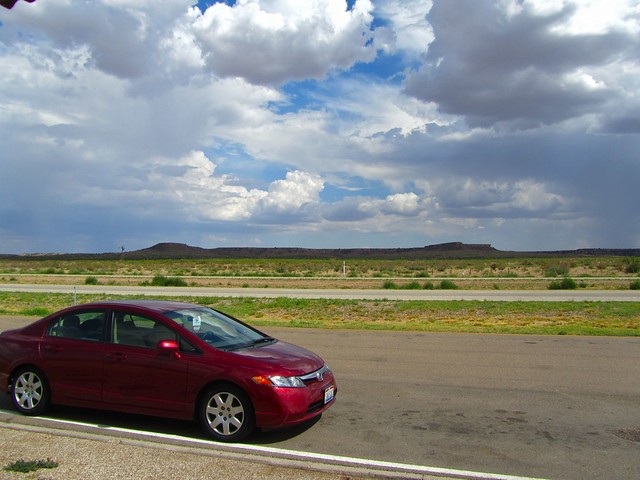
4. DON'T forget the extra water
Dehydration is not a joke, and can be a very real threat if you’re traveling out West during the summer. Always have extra water (in that cooler!), because you never know when you might break down, or decide that you want to go on a long hike.
5. DO let someone know where you plan to be every night
This might be more applicable for females road tripping together, but is a good idea for everyone. If possible, let someone back home know your basic route, and check in with them whenever possible. This way, if something happens, the chances of you being featured on that “I Shouldn’t Be Alive” show will be much less!
6. DON'T pick up questionable hitchhikers
Hitchhiking isn’t as popular in the U.S. as it is in some other countries, but people do still do it. If you’re comfortable giving people a ride, fine, but just keep your wits about you. My sister and I were reminded of this when, while driving through Oklahoma, we kept seeing signs warning us not to stop for hitchers since the highway was very close to a correctional facility…
Miscellaneous road trip tips
1. DO be aware of the impact you're having on the environment and the places you visit
Basically, don’t be a jerk. If you’re camping, clean up after yourself. If you’re visiting a site that asks you not to walk on something, respect that request.
And bear in mind that, even though all Americans share the same citizenship, that doesn’t mean that we all share the same beliefs, values, or way of life.
And lastly…
2. DO have a blast!
Road trips are one of the best ways to really get to know a country, and this is exceptionally true when it comes to America.
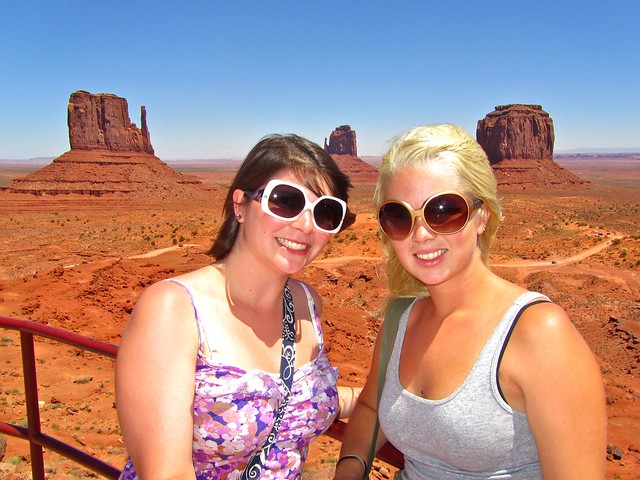
US road trip itineraries
Need some road trip inspiration? Here are some detailed road trip itineraries for road trips I've taken:
- A Perfect 10-Day Southwest Road Trip Itinerary
- The Perfect 12-Day Northern USA Road Trip Itinerary for Montana, Wyoming, and the Dakotas
- The Perfect 10-Day Road Trip Itinerary for Oregon in Summer
What to Pack for a USA road trip
The clothing and other odds and ends you pack for your road trip will of course depend on where you're going at at what time of year. But there are definitely a handful of things I highly recommend bringing:
- Physical maps, like the Rand McNally Road Atlas – because there definitely will be times when your smartphone won't get any signal!
- A cooler so you can stock up on cold water and snacks.
- Something to use as a trash can to keep your car tidy.
- A guide book (or two) that you can flip through along the way.
- A guide to campgrounds across America.
- An emergency kit to keep in your car – just in case.
- A power bank so you can easily charge electronics while you're in the car.
- A small bluetooth speaker to use when your radio signal cuts out.
- A sun hat and other forms of sun protection, because you'll definitely need it!
- Bug spray for those humid parts of the country.
- A quick-dry towel in case you decide on a quick swim or get caught in a rain storm.
See my full road trip packing list here: USA Road Trip Essentials: What to Pack for a US Road Trip
Have you ever road tripped across America? If not, is it something you plan to do someday?
Pin it for later:

Amanda Williams is the award-winning blogger behind A Dangerous Business Travel Blog. She has traveled to more than 60 countries on 6 continents from her home base in Ohio, specializing in experiential and thoughtful travel through the US, Europe, and rest of the world. Amanda only shares tips based on her personal experiences and places she's actually traveled!

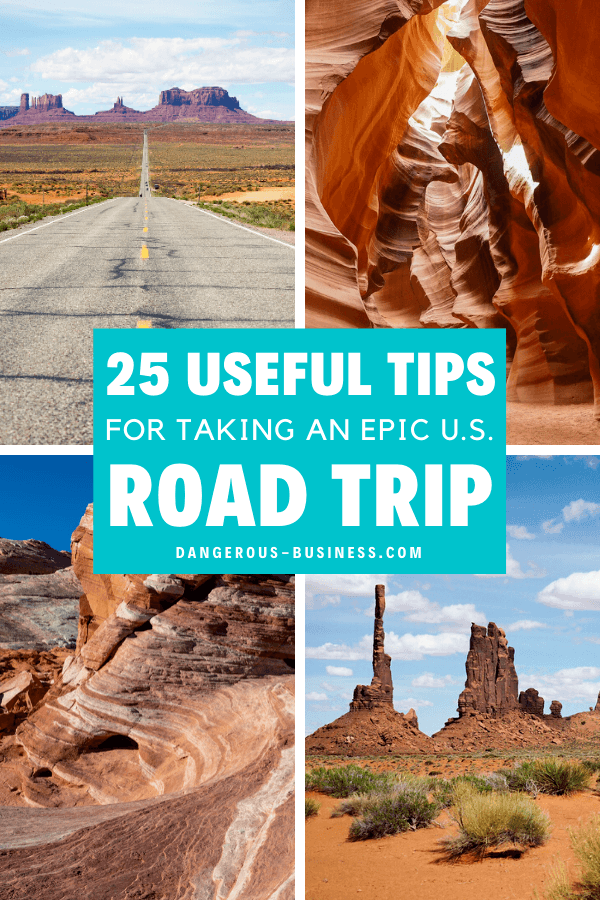
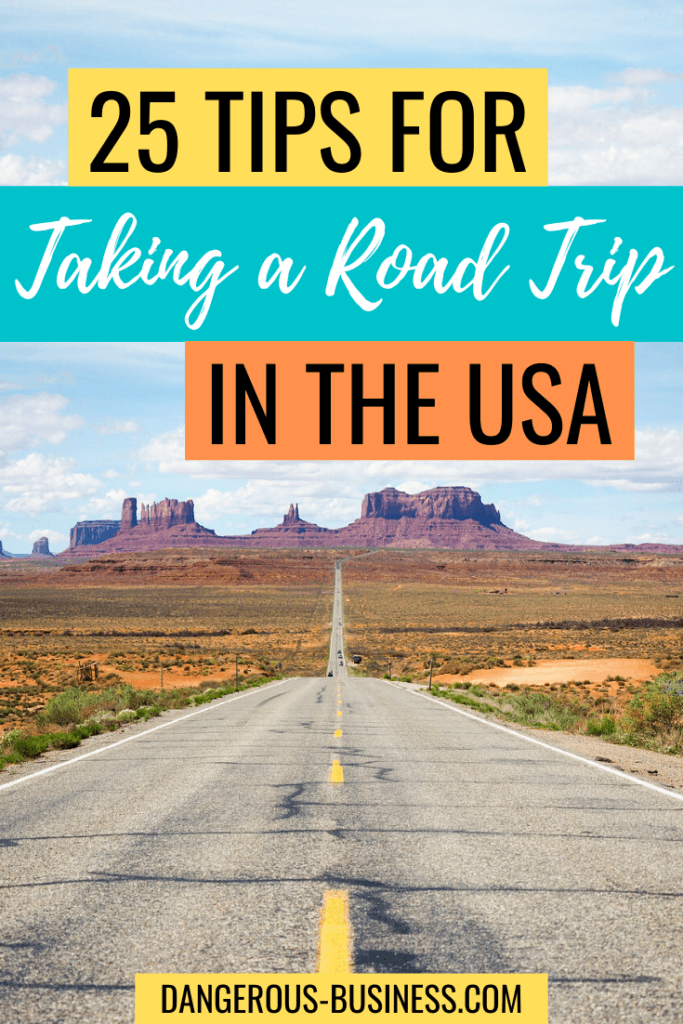









“DON’T travel with someone you can’t stand to be with 24/7.” This reminds me of When Harry met Sally a lot. Anyways, I will put the budgeting section of your article to good use once I have the chance to travel again. Great post Amanda!
Hey these were some good tips for sure, cheers for putting them up. Me and a mate are planning to do about 2 months driving around the States in the summer. You mentioned the US doesn’t have too many hostels, do you think its better to rent a car and find motels/hotels to stay in each spot, or to get a camper van type vehicle and sleep in that. I suspect campground fees are required at most spots so I’m thinking the camper van might not end up any cheaper in the end?
Any thoughts on this?
Thanks in advance!
I’ve never looked into campervans in the States, but my guess is that you might have a hard time finding a camper unless you want a full-on RV. And yes, you’d have to pay to stay in camp sites since we don’t do freedom camping here. I would suggest looking into the car/motels route. A car would be much cheaper to rent, and if the two of you split the cost of a motel you won’t be paying much more than you would in a hostel in Europe or Australia.
Hi guys. If anyone has some comments for me here would be awesome.I have a friend getting married on Vancouver Island in early June. I’m from New Zealand. Sooooo I thought if I’m going to make the trip I might as well make it a good one. Basically I want to go from Vancouver across to New York and then maybe down to florida. A short cruise around the Carribean maybe if time permits and maybe then fly back to LA and home to NZ from there.I know America is BIG. I need to try and plan this as well as I can but I’m not too sure about how much time I need to allow to drive these distances , see the sights worth seeing and getting where I need to when I need to. I will be ready to leave Vancouver on about the 7th or 8th of June and need to be back in New Zealand on about the 7th of July.I would love to drive something I could sleep in,i.e. saving money on accommodation. I would like to stay in New York for a couple of days and see some of the main sights ( especially Ground Zero world trades sight) as I am a Firefighter myself and have an affinity with the tragedy of 9/11.
Apparently there is a possibility of relocating campers or cars for rental companies from one city back to their base city , so any hints on this would be great.any help would be much appreciated. I have approx 1 Month for my road trip so looking forward to it. cheers guys. Graeme
Hey Graeme! I think you could definitely do that trip in a month, though you would have to pick and choose where you want to stop and spend some time. (Because yes, the US is HGUE!)
As for relocating cars/campers, we unfortunately don’t have a lot of camper vans here like you do in NZ. Mostly because freedom camping isn’t a thing here, and because the US is so big. You COULD look into car relocations, but you likely wouldn’t be able to spend a month traveling with one (usually a relocation gives you a strict deadline for when you have to deliver the car).
You might just have to bite the bullet and pay for a car! I would also consider staying in motels – they are always cheaper than hotels, and you’ll find them everywhere. (We don’t really have hostels here, either, except in major cities.)
Just surfing around looking for tips and ideas on road tripping in the US and came across this. Thanks for the write up, the park pass info was definitely helpful. We will be starting in Victoria, BC(home), driving down the coast to LA, then to Vegas…but not sure where to head next. We have 11 days and i’m not that interested in driving through Montana.
I would definitely suggest Arizona and/or Utah! The Grand Canyon is well worth seeing, and Utah is chock full of incredible landscapes and national parks.
Very helpful article! My friend an I are planning a 21 day road trip next August! We’re really hoping to do the west coast – however, being from Michigan this means we’d have to fly and rent a car. Do you have any car rental tips for 22 year olds?
I wish I had better advice, but it will probably be pretty pricey to rent a car for that long if you’re both under 25. 🙁 Do either of you have a car you could take? When my sister and I did a road trip a few years ago, we drove my car so we didn’t have to rent. Even if you wanted to hit up the West Coast, if you have 21 days and don’t mind a few long days of driving, you could drive to California in 4 days or so. (Plus, there are some awesome places to see between Michigan and the West Coast!)
Hi Guys ,
In the midst of planning a two week road trip from Las Vegas , taking in San Diego , L A , Monterey , Yosemite , San Francisco over a two week period. Have Hired a Mustang rag top from Alamo. End of August through to mid September , flights booked from the UK already. Read through your blog and found it very helpful so many thanks. Can’t wait , sooooooo excited.
That sounds like an awesome trip, Karl! And that’s generally a good time of year, too – San Francisco tends to get some of its best weather in September!
After going on a 6-week US road trip this summer I agree with every single point you made! Especially the ones about national parks. Me and my husband bought the national park pass and visited Carlsbad Caverns, Grand Canyon, Yosemite, Lassen, and Yellowstone – we had a blast! The only thing I would add is to not over-pack! We had way too much stuff with us, especially clothes. If you are on the road for a long time it is better to find a place to wash you clothes every week or two than to pack your car so full that it’s always a complete mess 🙂
Yes, that’s a great tip, too! It’s not as fun when you have way too much stuff with you.
Great adventure!! Do you know about car isnurances when crossing the border, Do we need one? It’s mandatory? I would like to know more on that.
I’m assuming you mean, like, if you’re crossing the border from Canada or Mexico and driving in the US? Yes, it’s mandatory to have car insurance here!
Good list! Rush hour is the worst – we got stuck through Houston en route to San Antonio and it literally added at least an hour to the trip. And paid wayy to much for a last minute motel in Boston.
I recommend Carhireplanet for rentals; absolute best deals we could find on cars anywhere online.
We were stuck in traffic in the loop around Chicago for like TWO HOURS. It was horrible.
I think a very important DO when traveling is having a good car insurance, specially if your planning to go through the border, mu recommendation here is BestMex, I have a great experience with them, and they give me great rates everytime I used it.
Good tip, Mike!
I’m taking a road trip at the beginning of July from NY to SD, Mount Rushmore to be exact. Totally forgot to take advantage of my AAA membership and get my free maps. I’m glad I stopped by thanks!
Oh yeah, and the cooler is key to road tripping!
The free AAA maps are great!
Used them when I drove to Alaska. That was years ago, so will need to upgrade.
Drove from Texas to Minneapolis last summer. Picked up a friend there and we then drove to Sturgis, for the motorcycle rally and Mt. Rushmore. Actually The Crazy Horse Monument is very impressive, though not complete. Proceeded down to Taos, N.M,, Then Roswell where we did not encounter any aliens to our disappointment. Returned home to Texas and my friend then flew back to Minn. Needed those AAA maps as we did get sidetracked a few times, but what fun.
Enjoyed this article so much and so glad that others are road tripping. Some years ago I drove from Texas to Alaska and then across Canada. I was on the Road 70 days and drove over 10,000 miles. Single, not a camper, but camped, I had no problems. It was AWESOME! Have taken road trips in England, Ireland, Japan, Panama, Costa Rica and New Zealand. If people take your advice their road tripping will open their eyes to just how great this country is, not to mention the people you meet along the way. My goal, now that I am retired is to drive the circumference of the U.S.
Wow, you are a SERIOUS road tripper! That’s so awesome.
I went on my first real road trip, just about a year ago and I agree with all of your tips! Especially, plan to spend more than you planned, and to make unexpected fun stops. And of course, getting your car checked before you leave. May I also suggest that you get it checked, before you head back home?! I ended up having a radiator problem and I was able to get some work done that would allow me to get home and then get the rest of the work done.
Bummer that you had some car trouble on the road! But good that you were able to get it mostly fixed. We always checked our tires and fluids, especially as we were driving through deserts.
This is a pretty good list. I went on one in July of 2013 with two friends and it definitely was a trip of a lifetime. We started in Georgia and traveled the south to the Grand Canyon and Vegas, then up Cali to Portland, then over to Yellowstone and Mt. Rushmore, then finally we travelled down through the fly over states back home! I came back with so many stories, memories, and this post just rekindled the flame!
That sounds like a pretty epic road trip!!
[…] Dos and donts on a road trip: https://www.dangerous-business.com/2012/03/dos-and-donts-on-a-great-american-road-trip/ […]